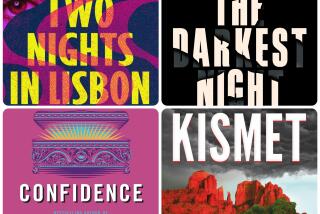Small town, magic snake in Stephen Dobyns’ ‘The Burn Palace’
- Share via
It feels like the end times are coming to little Brewster, R.I., one of those anonymous towns that used to have an economic purpose — fishing, quarry mining, farming, textiles — but now pretty much just holds beds for commuters who work in other places.
First, a newborn baby disappears from its crib in the local hospital, replaced by a large yellow snake. Then a stranger in town is stabbed and scalped in his car out by the Great Swamp, the site of historical atrocities during the Colonial era and local legends ever since. A band of overly large and aggressive coyotes — near wolves, really — have made the nights theirs. And a young schoolboy who owns the yellow snake that was stolen and left in the hospital crib moves toys around the floor just by thinking.
So the die is cast for a paranormal thriller in Stephen Dobyns’ latest, “The Burn Palace,” though the book quickly becomes something else. Dobyns has some 20 novels to his credit, and many, “The Burn Palace” included, are works of genre fiction that Dobyns uses to try to delve deeper.
“The Burn Palace” starts out like a run-of-the-mill Halloween-season slasher script but then morphs into a police procedural. That in turn is a device for Dobyns to conduct a semi-comedic dissection of small-town life and how unexpected violence both challenges and infatuates.
The story bounces among several central characters and a village of minor ones. One key figure is Woody Potter, a state police detective who gets called in once the baby is discovered missing. The nurse in charge was off on an illicit liaison with a doctor when the baby disappeared, a crucial detail she lies about and that hobbles the investigation. But that’s OK, because nobody really cares about the baby anyway: The magical appearance of the snake grabs the town’s attention.
Woody, an Iraq war vet with a cop’s hours, no desire for fatherhood and a reticence to discuss emotions, has recently been ditched by his live-in girlfriend, Susie. Woody, though, dislikes sleeping alone and is drawn first to the hospital administrator whose job is on the line over the disappearance, and then to a local newspaper reporter covering the case — revealing Woody’s rather loose embrace of ethics and professionalism. Still, you wind up rooting for the guy.
One of the book’s more intriguing characters is also one of the darkest: Karl Krause, fairly new to town and with a history of mental illness that, when he goes off his meds, turns into hallucinations and violence. By the middle of the novel Krause has gone feral after an act of horrific violence, skittering across the countryside on all fours and armed with a knife he imagines as his claws. Even the coyotes are no match.
For all of Dobyns’ skills in creating characters and place, the central plot line becomes transparent early. The subplots resonate better than the main plot, and the writing is strongest in the action scenes, which erupt with cinematic clarity.
Dobyns is sharp too, portraying people under stress. Some of the characters, though, never break out of single dimensions, a weakness of the novel. The gossipy coffee shop owner. The spunky old lady in the assisted-living home. The stoned war vet. State police Det. Bobby Anderson — “Hey, I’m their token black guy.” — has potential as a nuanced character, but Dobyns doesn’t break him out of the predictable either.
Anderson cracks wise with his white peers, drives a “magnetic black Nissan 370Z coupe with a rear deck spoiler,” and, as Woody points out, keeps himself “hidden behind the jive mask.” Which is fine if that’s the public persona Dobyns wants to give him, but as a novelist Dobyns can, and should, create a more deeply developed and nuanced character, even if only the reader can see that particular interior landscape.
But those are wrinkles in an otherwise enjoyable work of popular fiction.
Martelle, an Irvine-based writer, is the author most recently of “Detroit: A Biography.”
The Burn Palace
A Novel
Stephen Dobyns
Blue Rider Press: 480 pp., $27.95
More to Read
Sign up for our Book Club newsletter
Get the latest news, events and more from the Los Angeles Times Book Club, and help us get L.A. reading and talking.
You may occasionally receive promotional content from the Los Angeles Times.







